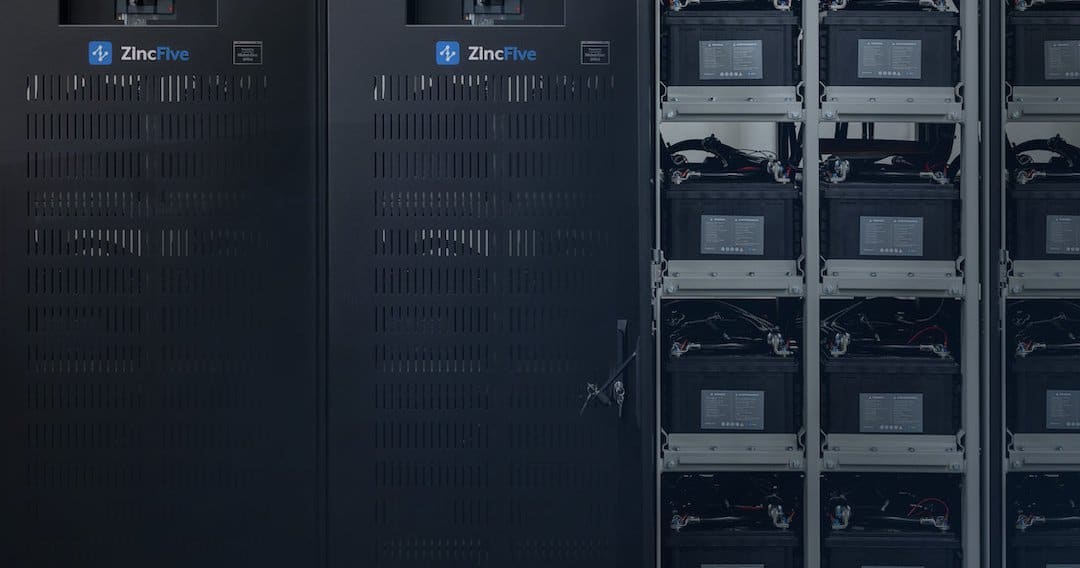Data center operators face continual pressure to deliver more with less: to improve data centers’ reliability, safety, and sustainability, all while working under economic constraints.
In this attempt, many have overlooked the uninterruptible power supply (UPS) system – but now that thoroughly tested nickel-zinc (NiZn) batteries have proven themselves on the market, they offer an opportunity to deliver all three benefits in one cost-effective package.
These batteries improve data centers’ reliability, sustainability, and safety, all while simultaneously delivering cost savings. Here’s how:
1) Smaller battery footprint = Reduced infrastructure costs
Space is at a premium in data centers, as precious square footage is prioritized for profit-making equipment such as data storage and servers. For infrastructure such as UPS systems, the less space they take up, the better.
This is where nickel-zinc batteries shine. They’re the highest power density batteries available for data centers, with about twice the power density of lead-acid batteries (the most common form of backup battery). This gives them the ability to support a large power demand for a short period of time, with a small footprint.
During a typical data center outage, the generator comes online in under a minute and supports the data center for the length of the outage, so the UPS battery is only required to transition the data center from utility to generator-supported operation.
A NiZn battery system nearly halves the space needed for batteries compared to traditional lead-acid and newer lithium ion solutions.
Nickel-zinc batteries’ smaller size and weight delivers multiple financial benefits because they not only open up more floor space for revenue-generating equipment, but also lower the capital cost of building data centers by reducing the space needed for battery storage.
2) Greater reliability = Fewer maintenance costs
Nickel-zinc batteries’ financial advantages go beyond a smaller space footprint: their greater reliability can save data centers hundreds of thousands of dollars.
This is because UPS failures are tied to expensive outages. Research from The Uptime Institute has found that outages are becoming longer and more costly, with one in five organizations reportedly experiencing a significant outage in the past three years.
However, 43 percent of outages in a data center are caused by the failure of the UPS system itself. Lead-acid batteries are often the culprits: they fail open or with a high impedance path, which prevents the battery from supporting the critical UPS load.
Nickel-zinc batteries’ greater reliability makes them ideal replacements for lead-acid batteries. First, they’re better suited to endure stress, especially varying temperatures. Second, their alkaline chemistry means that unlike lead-acid batteries, they do not sulfate over time. This extends their operating life to fifteen years – three times as long as lead-acid batteries’ lifespan.
Third, nickel-zinc batteries improve battery string reliability. When a cell in lead-acid or lithium batteries fails, it creates an open circuit that halts string operation. This results in two unwelcome scenarios: power backup failure for the entire battery string, and the operator having to pay for an expensive emergency maintenance event.
In contrast, a weak or depleted cell in a nickel-zinc battery remains conductive, which means the battery continues to discharge and carry the load. This means all that’s needed in the case of a weak or depleted NiZn cell is a simple battery replacement at the next planned maintenance cycle: little cost, and no operational impact.
Due to their greater resilience against environmental stressors, extended lifespan, and battery string reliability, nickel-zinc batteries help data centers protect themselves against the high costs of power backup failures.
3) Safer battery chemistry = Lower infrastructure, shipping and installation costs
Compared to lead-acid and lithium chemistries, nickel-zinc batteries’ greater safety lowers energy storage infrastructure as well as costs for battery shipping and installation. This safety stems from their non-toxic materials, lower shipping weight, lack of thermal runaway, no transportation restrictions, and ability to ship in energy storage systems completely assembled.
These characteristics make them easily shippable, with no special safety provisions needed – unlike shipping for lithium batteries, which have the potential for thermal runaway and require additional precautions and related expenses.
Once shipped, nickel-zinc batteries are also easily installed in both traditional and modular data centers. Due to their inflammable nature, they need no protective equipment, which reduces safety-related construction costs compared to the other battery types. Some battery cabinets also allow NiZn batteries to act as a drop-in replacement for lead-acid batteries, which lowers the barriers to replacing lead-acid with NiZn batteries.
4) Attract more customers with greater sustainability
Boundless Impact Research and Analytics carried out a Climate Impact Profile comparing the environmental impact of different backup battery chemistries, providing excellent information for data centers and their customers as they report Scope 3 emissions.
This profile revealed nickel-zinc batteries’ significantly lower impact on the environment across all six metrics of a battery life cycle analysis: carbon return on purchase (CROP), greenhouse gas (GHG) emissions, carbon payback time (CPT), volatile organic compounds (VOCs), water footprint, and energy footprint.
Put together, these environmentally friendly characteristics give nickel-zinc batteries the highest score for sustainability: 9.4 out of a possible 10.
Data center users are under pressure – and are increasing pressure on their data center operators – to report and reduce their impact on the environment. By offering an avenue to contribute towards sustainability goals, data centers can attract more customers and investors through their advantages in terms of environmental impact.
The (financial) power of good chemistry
Nickel-zinc UPS battery chemistries outperform lead-acid and lithium-ion solutions in performance, space footprint, reliability, safety, sustainability, and – as a result of these – cost effectiveness.
Their characteristics free up data center space and budgets for developing new capacity and services. These advantages change UPS and battery backup from a mere necessary overhead, into an opportunity to improve financial performance.

